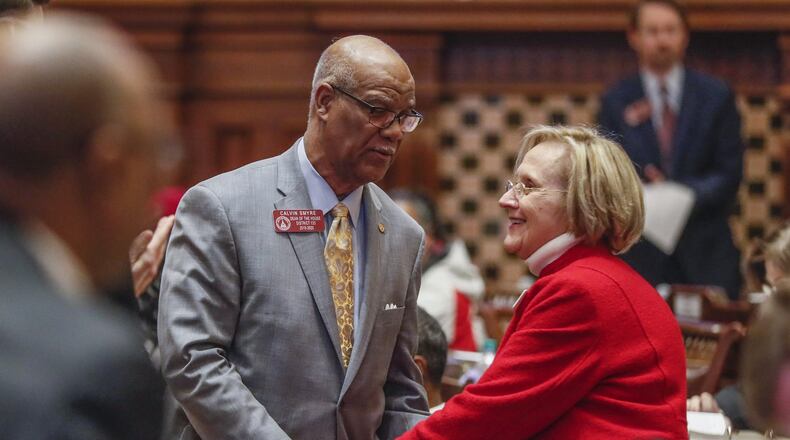When Georgia lawmakers reconvene on June 15, it will be a session for the history books.
First came a global pandemic that’s killed more than 2,000 Georgians and wreaked havoc on the state’s economy. Next is still-ongoing tumult over matters of race, driven recently by killings of African Americans nationwide, including a now-infamous case in Georgia.
That all creates powerful distractions from accomplishing the people’s business. Lawmakers must not let that happen. The stakes and risks of inaction are too high, so the pressure will be on to act quickly.
With only 11 legislative days remaining, two bills now before the Georgia Senate must be passed.
One covers hate crimes. The other would improve care standards at Georgia’s assisted living facilities and large personal care homes.
Both measures, while seemingly unrelated, share a common purpose – each would enact changes that could very well save lives. We can’t think of a higher purpose for legislation crafted by Georgia’s citizen-lawmakers. They should honor the Georgia Constitution’s preamble that calls for them to “insure justice to all, preserve peace, (and) promote the interest and happiness of the citizen and of the family.”
Quickly passing these two bills will move Georgia significantly toward achieving those promises and better protect vulnerable people.
The Georgia House has already done its part in passing both bills. Indeed, the hate crimes bill has waited a full year for action by the Georgia Senate.
The Senate should likewise approve these bills before the Legislature adjourns this year.
The old political saying about not letting the perfect be the enemy of the good fully applies here.
Lengthy committee hearings or sundry amendments shouldn’t be used to slow, or stall, either the hate crimes or senior care bills. They’re too important to Georgians to have them fizzle out for this year.
The senior facility bill, HB987, is sorely needed. Georgia’s experience with the COVID-19 pandemic shows that. If you include skilled nursing homes, which are admittedly not covered under HB987, more than 1,000 Georgians have died in nursing homes, assisted living and large personal care homes. Nearly 2,500 workers have tested positive for coronavirus. At one assisted-living center, 17 residents have died of COVID-19. And not all residents or employees of the state’s senior care homes have even been tested yet.
The Atlanta Journal-Constitution’s “Unprotected” series last fall brought to light deaths linked to breakdowns in care. We also uncovered nearly 700 documented instances of neglect or abuse in assisted living and large personal care homes in Georgia.
The pandemic’s human toll, as well as our earlier reporting, make a conclusive case that the legislation’s strengthened safeguards are desperately needed to improve overall care quality here. The bill is generally supported by the industry, and lobbyist voices seeking to ease the bill’s standards should pale in comparison.
Senior care facilities must do a better job in Georgia, and HB987, as it is written, is a solid start toward that necessity.
The bill passed the House on a vote of 160 to 1. A similarly overwhelming “yes” vote should happen in the Senate, and the bill should be signed this year by Gov. Brian Kemp.
Kemp and House Speaker David Ralston have voiced support for the bill. It’s now up to Lt. Gov. Geoff Duncan to push the Senate toward quick passage of the measure.
The other must-do for lawmakers is to approve hate-crimes legislation. The Senate should quickly pass HB426, as the House did in 2019.
The outrageous and heartbreaking events of recent months, or across any time period really, shows the need for a hate crimes law here. Depending on what’s measured, Georgia is one of only four or five states lacking such a statute.
The case of Ahmaud Arbery, chased in a truck by white men and shot to death on a Glynn County subdivision road, is a Georgia-centric Exhibit A for why such legislation is needed. A preliminary hearing last week revealed that one of the defendants allegedly shouted a racial slur as Arbery lay dying.
The killing of Arbery has put Georgia in the world’s spotlight. If we truly want to be a modern state that’s globally competitive, Georgia must have the tools in place to ensure justice can be done. A hate crimes law is a necessary part of that.
Lt. Gov. Duncan and the Georgia Senate, through prompt action, can make that happen. Duncan has said he’d like to see the bill better specify things like the right to sue. Given the litigious nature of today’s society, we’d suggest that the current legal code provides sufficient options for aggrieved parties to pursue in civil courts. Adding another layer to Georgia’s existing legal code shouldn’t delay – or threaten – HB426’s passage, in our view.
In an imperfect world, perfect laws may be unattainable. A good and necessary law that’s on the books seems far preferable to seeking flawless legislation that never leaves Gold Dome chambers as a result.
The senior care and hate crimes bills each have a high likelihood of helping prevent harm to innocent Georgians.
Moving them quickly through to becoming law will help protect both Georgia’s people and our hard-won reputation as a formidable competitor in the nation and world.
The Editorial Board.
About the Author
Keep Reading
The Latest
Featured

